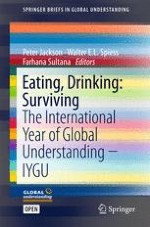Open Access 2016 | Open Access | Buch

Eating, Drinking: Surviving
The International Year of Global Understanding - IYGU
herausgegeben von: Peter Jackson, Walter E.L. Spiess, Farhana Sultana
Verlag: Springer International Publishing
Buchreihe : SpringerBriefs in Global Understanding